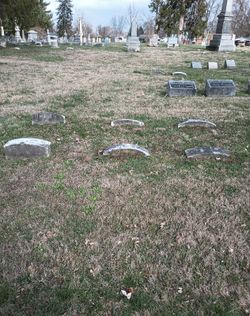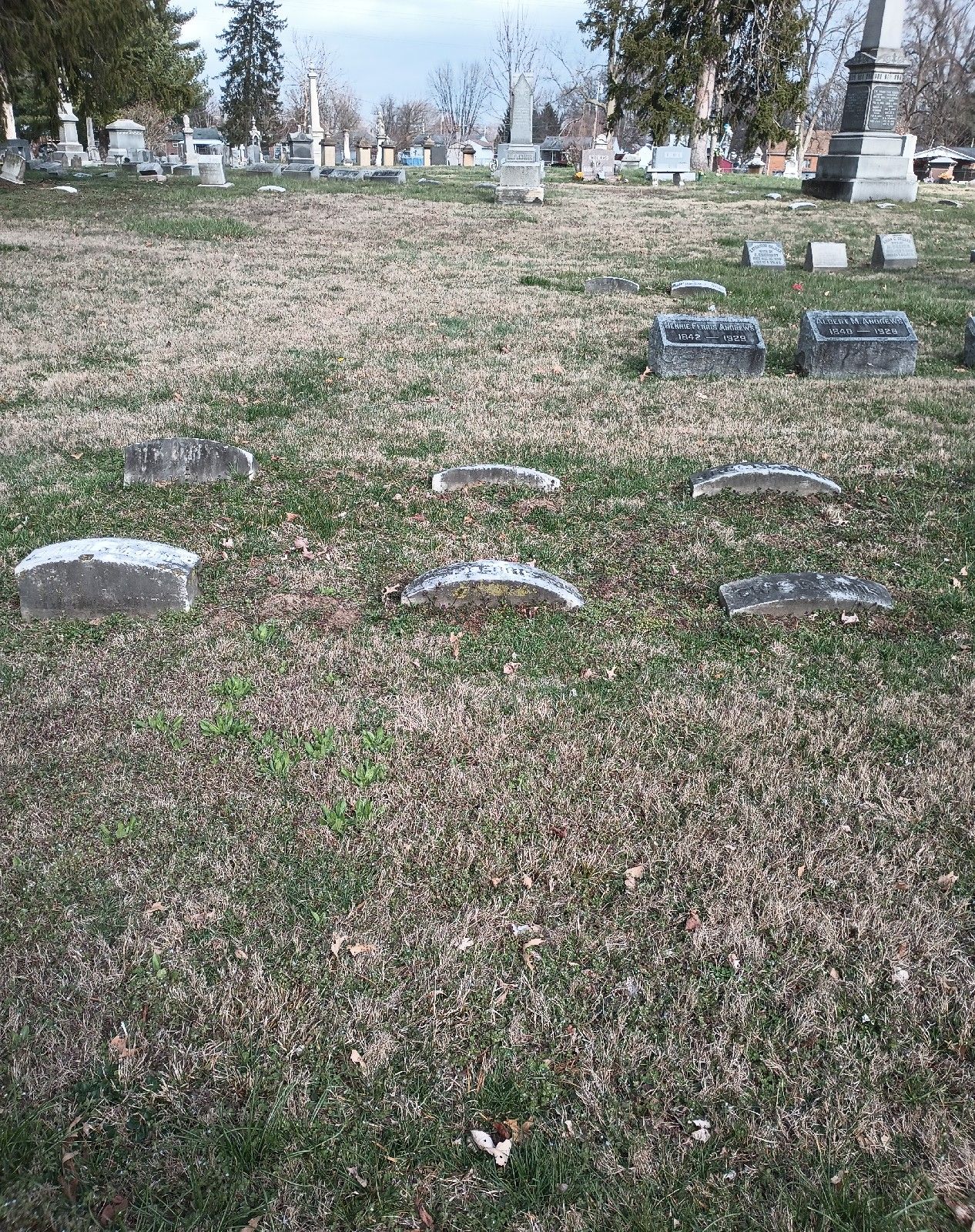1) Rhoda Wheeler Ferris (married 15 Sept 1807)
2) Frances A Fisher (married 24 Feb 1848, Dearborn Co., IN; b. 1801)
Other Children:
~ John Jonathan Ferris (b. 1816)
~ William Henry Ferris (b. 1822)
Member of Indiana State House of Representatives, 1837-38
"The first colony to settle at Columbia, near the mouth of the Little Miami river, comprised the names of persons afterwards somewhat familiar in the early settlement of Dearborn county. On the list of names given for that settlement are found that of Hugh Dunn, Elijah Mills, Abram Ferris, John Ferris, and Ezra Ferris."
(source: "History of Dearborn County, Indiana. . .", edited by Archibald Shaw, 1915, p. 111)
"Col. Abram Ferris came to the township from Cincinnati in 1831. He was a brother of Dr. Ezra Ferris and had been a prominent business man in that city. Concluding to retire to a farm, after years of successful business life, he purchased a section of land on the Manchester pike and erected the largest and finest residence in the county. He also purchased two sections just over the Ripley county line and close to the state road. He farmed on a large scale and was quite as successful a farmer as he had been a business man. His son, Benjamin F. Ferris, lived on the Ripley county farms for most of his later life and was one of the best men of this section of the state, being known far and wide as one of the best informed men of his generation. Herewith is an interview, published in the 'Versailles Republican', from Mrs. F.B. Freeland, a daughter of Rev. Benjamin Franklin Ferris and a granddaughter of Col. Abram Ferris. The interview is published in 'The Republican' under date of July 21, 1915, and for accurate description of farm life and work of a half century ago, it can hardly be excelled: 'Grandfather Ferris, Col. Abram Ferris as he was known, purchased from the government, during Jackson's administration, three tracts of land containing six hundred and forty acres each. One on the Lawrenceburg hill on the Manchester pike, one near Napoleon, the other two miles south of Sunman. Father, B.F. Ferris, controlled the latter, and it was in the family until quite recently. Three hundred acres of the land was kept in meadow for years. During harvest thirty men were employed for six weeks to attend to the crop, all cut with scythes and raked with wooden hand rakes. At that time all the farmers kept whisky for their men, and the consequence was that some days they were nearly all drunk. Grandfather vetoed it. He called the men together and informed them that there would be no more whisky. All that could not work without it could stop. They all stopped, some swore, others pouted and declared they would not work. But they all changed their minds and finally became resigned. The trouble ended then and there. The hay was pressed with an old wooden screw press with two sweeps. Its music, which was not the most melodious, could be heard for miles. The first reaper and mower, the McCormick, was introduced by Eber Jones, of Greensburg. Then a wooden rake was purchased. Father built a large two-story barn, which required one hundred men two days to raise. In the second story a threshing floor was made, surrounding a modern hay press, called a pounder press. The bales of hay were encircled by split wooden hoops soaked in vats and were nailed together. After wheat raising was introduced on the farm, the threshing was done on the floor spoken of. The sheaves of grain were spread on the floor and eight or ten horses were used for tramping it. It was occasionally turned and the tramping continued until the grain was all separated from the straw, then removed, and another supply placed there. It was then run through a fanning mill turned by hand and no small amount of work required. Our school houses were of logs with long benches without backs, no classes except reading and spelling. Young men six feet in height came. They ciphered from morning until night, and aimed to beat each other through the arithmetic. If they were puzzled the teacher would solve it, if he could, without explanation. Anyone could get a teacher's license who could read and write and whip. From the year 1855 to 1860 father held the office of township trustee. There were no banks, and as he drew the money for the teachers' pay in the fall, he gave it to mother for safe keeping. At one time he had $3,000. Mother wrapped it in paper (it was paper money) and placed it in a straw tick on her spare bed, as was the custom. In the spring, as the school was drawing to a close, he asked for the money. She had forgotten about it and where she had put it. Then she remembered she had emptied the straw in the hog yard, which contained about 30 or 40 hogs, six weeks before. They never expected to see it again, but after a careful search it was found in perfect order. The hogs did not seem to relish as costly food as some people do now.'
Col. Abram Ferris had been gathered to his fathers. His son, Rev. B.F. Ferris, has followed, the fine colonial mansion caught fire and was burned to the ground. The family, like most of families in this country of ours, is scattered; the land about the old mansion is now owned by Deidrich Ellinghausen, who has erected modern buildings capacious barns and the place is once more taking on its former attractiveness."
(source: "History of Dearborn County, Indiana. . .", edited by Archibald Shaw, 1915, pp. 187-188; 190-191)
(sources: Indiana, Marriages, 1811-1959, Dearborn, 1846-1854, Vol 8)
1) Rhoda Wheeler Ferris (married 15 Sept 1807)
2) Frances A Fisher (married 24 Feb 1848, Dearborn Co., IN; b. 1801)
Other Children:
~ John Jonathan Ferris (b. 1816)
~ William Henry Ferris (b. 1822)
Member of Indiana State House of Representatives, 1837-38
"The first colony to settle at Columbia, near the mouth of the Little Miami river, comprised the names of persons afterwards somewhat familiar in the early settlement of Dearborn county. On the list of names given for that settlement are found that of Hugh Dunn, Elijah Mills, Abram Ferris, John Ferris, and Ezra Ferris."
(source: "History of Dearborn County, Indiana. . .", edited by Archibald Shaw, 1915, p. 111)
"Col. Abram Ferris came to the township from Cincinnati in 1831. He was a brother of Dr. Ezra Ferris and had been a prominent business man in that city. Concluding to retire to a farm, after years of successful business life, he purchased a section of land on the Manchester pike and erected the largest and finest residence in the county. He also purchased two sections just over the Ripley county line and close to the state road. He farmed on a large scale and was quite as successful a farmer as he had been a business man. His son, Benjamin F. Ferris, lived on the Ripley county farms for most of his later life and was one of the best men of this section of the state, being known far and wide as one of the best informed men of his generation. Herewith is an interview, published in the 'Versailles Republican', from Mrs. F.B. Freeland, a daughter of Rev. Benjamin Franklin Ferris and a granddaughter of Col. Abram Ferris. The interview is published in 'The Republican' under date of July 21, 1915, and for accurate description of farm life and work of a half century ago, it can hardly be excelled: 'Grandfather Ferris, Col. Abram Ferris as he was known, purchased from the government, during Jackson's administration, three tracts of land containing six hundred and forty acres each. One on the Lawrenceburg hill on the Manchester pike, one near Napoleon, the other two miles south of Sunman. Father, B.F. Ferris, controlled the latter, and it was in the family until quite recently. Three hundred acres of the land was kept in meadow for years. During harvest thirty men were employed for six weeks to attend to the crop, all cut with scythes and raked with wooden hand rakes. At that time all the farmers kept whisky for their men, and the consequence was that some days they were nearly all drunk. Grandfather vetoed it. He called the men together and informed them that there would be no more whisky. All that could not work without it could stop. They all stopped, some swore, others pouted and declared they would not work. But they all changed their minds and finally became resigned. The trouble ended then and there. The hay was pressed with an old wooden screw press with two sweeps. Its music, which was not the most melodious, could be heard for miles. The first reaper and mower, the McCormick, was introduced by Eber Jones, of Greensburg. Then a wooden rake was purchased. Father built a large two-story barn, which required one hundred men two days to raise. In the second story a threshing floor was made, surrounding a modern hay press, called a pounder press. The bales of hay were encircled by split wooden hoops soaked in vats and were nailed together. After wheat raising was introduced on the farm, the threshing was done on the floor spoken of. The sheaves of grain were spread on the floor and eight or ten horses were used for tramping it. It was occasionally turned and the tramping continued until the grain was all separated from the straw, then removed, and another supply placed there. It was then run through a fanning mill turned by hand and no small amount of work required. Our school houses were of logs with long benches without backs, no classes except reading and spelling. Young men six feet in height came. They ciphered from morning until night, and aimed to beat each other through the arithmetic. If they were puzzled the teacher would solve it, if he could, without explanation. Anyone could get a teacher's license who could read and write and whip. From the year 1855 to 1860 father held the office of township trustee. There were no banks, and as he drew the money for the teachers' pay in the fall, he gave it to mother for safe keeping. At one time he had $3,000. Mother wrapped it in paper (it was paper money) and placed it in a straw tick on her spare bed, as was the custom. In the spring, as the school was drawing to a close, he asked for the money. She had forgotten about it and where she had put it. Then she remembered she had emptied the straw in the hog yard, which contained about 30 or 40 hogs, six weeks before. They never expected to see it again, but after a careful search it was found in perfect order. The hogs did not seem to relish as costly food as some people do now.'
Col. Abram Ferris had been gathered to his fathers. His son, Rev. B.F. Ferris, has followed, the fine colonial mansion caught fire and was burned to the ground. The family, like most of families in this country of ours, is scattered; the land about the old mansion is now owned by Deidrich Ellinghausen, who has erected modern buildings capacious barns and the place is once more taking on its former attractiveness."
(source: "History of Dearborn County, Indiana. . .", edited by Archibald Shaw, 1915, pp. 187-188; 190-191)
(sources: Indiana, Marriages, 1811-1959, Dearborn, 1846-1854, Vol 8)
Family Members
Advertisement
Advertisement














